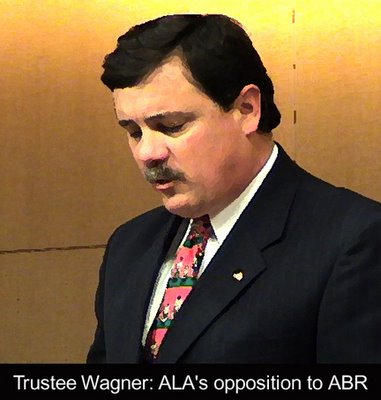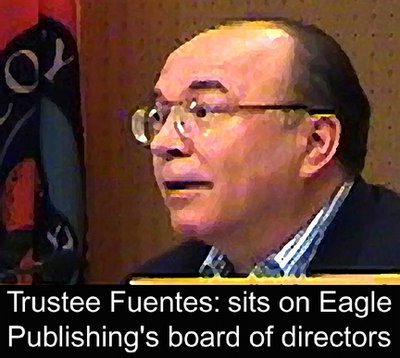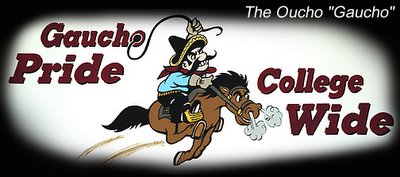 Yesterday, I mentioned David Horowitz's book The Professors, which is published by Regnery Publishing. Trustee Fuentes sits on the board of directors of Eagle Publishing, which controls Regnery.
Yesterday, I mentioned David Horowitz's book The Professors, which is published by Regnery Publishing. Trustee Fuentes sits on the board of directors of Eagle Publishing, which controls Regnery.Horowitz is most famous, or most infamous, for proposed legislation called the "Academic Bill of Rights" (ABR). It has been introduced in 17 states in recent years.
During the recent board discussion in which Trustee Wagner led the board to end our colleges' memberships in the American Library Association, Wagner mentioned the ALA's opposition to the ABR. I could be mistaken, but Mr. Wagner seemed to imply that he favors the ABR. It's likely that Trustee Fuentes favors it too. (As far as I know, neither man has expressed a position on ABR.)

Some elements of ABR are unobjectionable. But, as the AAUP explains, "other parts of the proposal reach into the classroom to suggest that what you teach, how you teach it, what you assign, and what you hand out, should be overseen by the administration...."
Thus far, to my knowledge, the ABR has made no headway in any state legislature. It generally gets tabled or shot down.
The AAUP warns that, though ABR has not been adopted by any state, "Similar proposals may be offered on your campus by student organizations or even student governments." Therefore, we had better be clear about the ABR's content.
The AAUP has a web site that offers various resources re the ABR (Proposed Government Oversight on Teaching & Learning). The following summary is from a "handout" available on the AAUP web site (Coming to your campus soon).
Summary of the "Academic Bill of Rights" Proposals
"The Academic Bill of Rights ... threatens to impose administrative and legislative oversight on the professional judgment of faculty, to deprive professors of the authority necessary for teaching, and to prohibit academic institutions from making the decisions that are necessary for the advancement of knowledge... The AAUP has consistently held that academic freedom can only be maintained so long as faculty remain autonomous and self-governing." (Most responses in this section are drawn from the AAUP Statement on the Academic Bill of Rights, available on the AAUP web site, above.)
The "Academic Bill of Rights" proposals list the following rights:
A right of "access to a broad range of serious scholarly opinion." This section states that institutions should foster a "plurality of serious scholarly methodologies and perspectives." The problem, according to the AAUP Statement, is that "it invites diversity to be measured by political standards that diverge from the academic criteria of the scholarly profession. Measured in this way, diversity can easily become contradictory to academic ends."
A right to grading based on "reasoned answers and appropriate knowledge of the subjects they study" and not on their "political or religious beliefs." AAUP's Joint Statement on Rights and Freedoms of Students agrees that students should be free of unfair academic evaluation. "Students should be free to take reasoned exception to the data or views offered in any course of study and to reserve judgment about matters of opinion, but they are responsible for learning the content of any course of study for which they are enrolled." Campus grievance processes are generally available to students. These processes usually support fair grading without infringing on the pedagogical judgment of the faculty. The legislative proposals would infringe on faculty rights by encouraging administrative oversight over this pedagogical function.
A right to be free of "instructors who persistently introduce controversial matter into the classroom or coursework that has no relation to the subject of study..." The problem is: Who is to distinguish between proper pedagogy and improper "indoctrination?" According to the legislative proposals, the question would be determined first by student complaint, and then by the administration or the courts. But according to the AAUP statement, this distinction "is to be determined by reference to scholarly and professional standards, as interpreted and applied by the faculty itself."

A right to have faculty in the classroom "make their students aware of serious scholarly viewpoints other than their own" and to have "curricula and reading lists in the humanities and social sciences [that] respect all human knowledge in these areas and provide students with dissenting sources and viewpoints." This provision is the most directly intrusive into the prerogatives of the classroom teacher. Who determines the "range of human knowledge"? Who would enforce this rule? Most likely, the administration, in order to avoid suit.
A right to have hiring, firing, promotion, and tenure decisions for faculty (and inclusion in committees that make such decisions) ... made on the basis of competence and appropriate knowledge in their field of expertise, not on the basis of religious or political beliefs. While the basic principle is sound, the Academic Bill of Rights is an "improper and dangerous method for its implementation," because of its reliance on administrative and legal intervention.
A right to have student fee funds distributed on a "viewpoint-neutral basis," maintaining a "posture of neutrality" with respect to political and religious opinions. The law on this subject is well settled in the 2000 Supreme Court case, Board of Regents of the University of Wisconsin System v. Scott Southworth, et al. The United Council of University of Wisconsin Students describes the Court's guidance on "viewpoint neutrality:" (Link).
And finally, notices of student and faculty rights should be included in course catalogues, student handbooks, and on the institutional web site. Most campuses have student and faculty handbooks, printed and on their web sites, describing the full range of faculty and student rights. Encourage your students to know and understand their rights and responsibilities.




